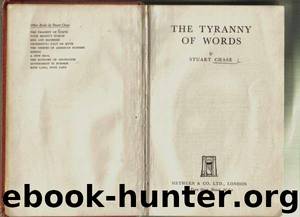The Tyranny of Words by Stuart Chase

Author:Stuart Chase
Language: eng
Format: mobi
Tags: PDF
Published: 1938-03-03T05:00:00+00:00
THE TYRANNY OF WORDS
146
to weight. Not until Galileo performed an operation two thousand years later were these remarkable “principles”
dethroned.
We must remember that Aristotle was not responsible for all the mistakes of his followers, especially the theologians of the Middle Ages who called him “The Philosopher,” and had available only a fraction of his published works. He above most of his contemporaries tried to study nature. He collected and classified specimens and even did some dissecting.
Language was reduced to an orderly instrument by the Greeks with rules of grammar. They worked up emotive associations of words through their marvellous poetry and drama; they inaugurated technical philosophy and formal logic. They were powerful reasoners. The world has seldom seen their like. But they were close enough to primitive backgrounds to carry over a large amount of word magic. Their early philosophers regarded words as possessing power in themselves, even as the infant and the conjurer regard them. To classify, some of them believed, was to name, and the name of a thing was its soul, its essence. Therefore to know the name was to have power over souls. This sorcery was known as the doctrine of the “Logos, 5 ' St. John begins bis gospel with an echo of the doctrine: “In the beginning was the word, and the word was with God, and the word was God.“
The power to reason is as helpful as it is human. But beware of idolizing reason as such. Reasoning for what? Where? When? If it is mental exercise from thought to word, it moves no farther forward than President Goolidge's electric horse. The Greeks were the founders of metaphysics. “The effect of verbal symbols in the hands of metaphysicians,” observe Ogden and Richards, “is to keep inconsistent attitudes forcibly united, convincing human reason of the absence of logical inconsistency in the greatest of absurdities,”
“The One,” “the Good,” and “Idea of Good” were identical in Plato’s mind. By his follower, Plotinus, on the contrary, “the One” is explicitly exalted above the image of “the One,” and transcends existence altogether.
PROMENADE WITH THE PHILOSOPHERS 147
Indeed it does. Plato was frankly an idea man. He took the forms of solids which the mathematicians had discovered and moved them into his cosmology. A cube was the earth; a tetrahedron was fire; an octahedron was water; an icosahedron was air; while a dodecahedron was “the all thing,” No reasons were assigned: “Thus I conceive it, it is best.” He went on to conceive that the universe had a soul, moving in perpetual circles, Man's soul was in his circular head. “God, imitating the spherical shape of the universe, enclosed the two divine courses in a spherical body, which we now term the head.” But God foresaw “that this head, being spherical, would roll down the hills and could not ascend steep places. To prevent this, a body with limbs was added, that it might be a locomotive for the head. As the fore parts are more honourable and regal than the
Download
This site does not store any files on its server. We only index and link to content provided by other sites. Please contact the content providers to delete copyright contents if any and email us, we'll remove relevant links or contents immediately.
The Art of Thinking Clearly by Rolf Dobelli(10464)
Mindhunter: Inside the FBI's Elite Serial Crime Unit by John E. Douglas & Mark Olshaker(9327)
Change Your Questions, Change Your Life by Marilee Adams(7765)
Nudge - Improving Decisions about Health, Wealth, and Happiness by Thaler Sunstein(7696)
Mastermind: How to Think Like Sherlock Holmes by Maria Konnikova(7326)
The Power of Now: A Guide to Spiritual Enlightenment by Eckhart Tolle(5762)
Men In Love by Nancy Friday(5235)
Altered Sensations by David Pantalony(5095)
Factfulness: Ten Reasons We're Wrong About the World – and Why Things Are Better Than You Think by Hans Rosling(4737)
The Confidence Code by Katty Kay(4252)
Thinking in Bets by Annie Duke(4218)
Man and His Symbols by Carl Gustav Jung(4131)
The Worm at the Core by Sheldon Solomon(3486)
Why Buddhism is True by Robert Wright(3447)
Liar's Poker by Michael Lewis(3443)
Three Women by Lisa Taddeo(3426)
The Inner Life of Animals by Peter Wohlleben(3313)
Descartes' Error by Antonio Damasio(3272)
How Music Works by David Byrne(3262)
